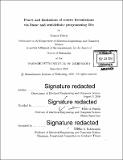Power and limitations of convex formulations via linear and semidefinite programming lifts
Author(s)
Fawzi, Hamza
DownloadFull printable version (13.74Mb)
Other Contributors
Massachusetts Institute of Technology. Department of Electrical Engineering and Computer Science.
Advisor
Pablo A. Parrilo.
Terms of use
Metadata
Show full item recordAbstract
Convex relaxation methods play an important role in mathematical optimization to tackle hard nonconvex problems, and have been applied successfully in many areas of science and engineering. At the heart of such methods lies the question of obtaining a tractable description of the convex hull of a set. In this thesis we focus on the question of finding tractable representations of convex sets via the method of lifting, whereby the "hard" convex set is expressed as the projection of a simpler one living in higher-dimensional space. We derive new results and insights on the power and limitations of such liftings. In the first part of the thesis we study limitations of the lifting method and develop lower bounds on the sizes of linear programming (LP) and semidefinite programming (SDP) lifts of polytopes. For LP lifts the bound we develop applies generally for the nonnegative rank of matrices and we compare our method with existing combinatorial and non-combinatorial techniques. For SDP lifts we focus on so-called equivariant lifts that respect symmetry, and obtain lower bounds on the size of such lifts for certain combinatorial polytopes by exploiting the connection with the sum-of-squares method. In the second part of the thesis, we study the power of the lifting procedure and show how to obtain small semidefinite lifts for certain classes of polytopes via the idea of sparse sums of squares. We develop a graph-theoretic method to construct such lifts and use it to resolve a conjecture of Laurent from 2003 on the cut polytope, and to give an explicit sequence of polytopes with a gap between LP and SDP lifts. Finally we depart from the specific question of constructing lifts and consider the general problem of certifying nonnegativity of functions. We study a class of certificates rooted in convex duality and show that they encompass many existing methods for proving nonnegativity based on convex optimization. In particular we propose a new proof system to certify nonnegativity of entropy-like functions, which we illustrate on the problem of computing the logarithmic Sobolev constant of finite Markov chains.
Description
Thesis: Ph. D., Massachusetts Institute of Technology, Department of Electrical Engineering and Computer Science, 2016. Cataloged from PDF version of thesis. Includes bibliographical references (pages 155-162).
Date issued
2016Department
Massachusetts Institute of Technology. Department of Electrical Engineering and Computer SciencePublisher
Massachusetts Institute of Technology
Keywords
Electrical Engineering and Computer Science.